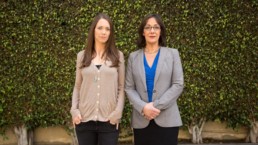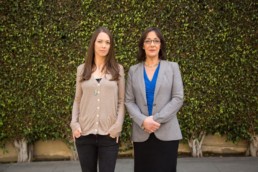Director Meryl Goldsmith on ‘The Syndrome’
This is a custom heading element.
Before The Syndrome screened at this year’s Newport Beach Film Festival, we got the chance to talk to the film’s director, Meryl Goldsmith, who collaborated with investigative reporter Susan Goldsmith to bring forth a documentary about shaken baby syndrome. Together, they bring to light the controversial theory that shaken baby syndrome may just be a label that hospitals and social workers accuse alleged child-abusing parents of if their child has an injury similar to that of a shaken baby projected injury. The result is thousands of parents, claiming innocence, thrown behind bars away from their families, justly or not. In our exclusive interview, Goldsmith talks about her passion for investigative journalism, the controversy surrounding this topic, and the anticipated reaction from the public after the film’s release. We begin:
TO SEE THAT THERE IS MORE INFORMATION THAT WE AS THE PUBLIC DON’T KNOW ABOUT SHAKEN BABY SYNDROME IS FASCINATING.
When Susan [Goldsmith, Award-winning investigative reporter] told me about it I was very skeptical about it, and so was she when she first heard there was any doubt about it. I think it’s all so engrained in us now to never shake and of course that’s a method we agree with, but the question is not whether or not to do that, it’s actually has this ever even been happening? As said in the film, in 1997 this was mythology. I thought that was pretty fascinating.
WHAT DREW YOU TO THE PROJECT IN THE FIRST PLACE?
I called Susan to potentially collaborate on one of my next films and she told me about the shaken baby story and that they weren’t going to run at the Oregonian newspaper, where she worked at the time. I feel like investigative journalism is very important and needs to stay alive so I thought we could do it as a film. It was really heartbreaking to hear about this happening to all these families all across the country. I wanted to figure out a way to break this story with a film.
I’M CURIOUS HOW YOU FOUND YOUR DIFFERENT SUBJECTS?
Susan talked to the doctors who were featured in the film and asked them for names of people who, with their permission, would talk to us. They reached out to families who they felt were more vocal like Kathy Hyatt. Deborah Tuerkheimer wrote some really prestigious law articles about this and we felt she was really knowledgeable, that’s why we included her. Susan knew Bennett Gershman [law professor at Pace Law School and served as state prosecutor in New York investigating corruption in the judicial system] so we contacted him. Quite the lineup of people and yeah, that was all Susan and we are really happy with the results.
WHAT KIND OF RESISTANCE ARE YOU ANTICIPATING, BOTH FROM THE GENERAL PUBLIC AND ALSO THE SHAKEN BABY SYNDROME CLINIC?
I think the resistance we’re facing from the general public, and I read a quote once that helps me out with a lot of that, is, “It’s easier to fool people than convince them they’ve been fooled.” I believe that applies here because we are so engrained in shaken baby and so unwinding that to have a conversation about it without people [disregarding it] is a challenge. I think what we’re facing from people who are even more closely associated with “sbs” in the medical field is that they’re saying our film dangerously promotes child abuse. They say people are going to leave the theatre thinking it’s ok to shake a baby which, if you’ve seen the film, we say it’s not a good idea to shake a baby. What I’ve noticed is just saying the words “child abuse,” people seem to go a little funky in the head and I understand, it’s an emotional issue. Susan helped get two laws passed to help children in the foster system in Oregon, she’s been reporting on real child abuse since the 90’s. We know what a big problem it is.
IS THERE ANY EVIDENCE THAT YOU KNOW OF WHERE SOMEONE ACTUALLY DID SHAKE THEIR BABY?
There are cases where a battered child will have scars from various times around their body, often in places where they’re hidden like the stomach. If there is actually a battered child then the doctors in the film won’t take the case. They wouldn’t testify in defense of a person who they thought was really abusive.
ONE OF THE THINGS I FOUND REALLY HAUNTING WERE THE IMAGES OF THE DOLLS THAT WERE SHOWING YOU WHAT IT WAS SUPPOSED TO LOOK LIKE TO VIOLENTLY SHAKE A BABY.
People sometimes even laugh at it, like shaking a Cabbage Patch doll which is like a few ounces probably. Real babies are several pounds and a lot of the times they’re saying that people shook a 14 month-old baby. If you actually hold a baby that heavy out in front of you and then try to violently shake it, and they’re accusing a woman that’s 5’4 and 105 pounds shaking a 30 pound baby, I mean a lot of the time the science doesn’t even add up. Their demonstrations are never on the real life-size dummies, and when they are, they can’t get the injuries even on their own studies.
For our review of The Syndrome, click here.
WHAT IS THE RELEASE PLAN FOR THE FILM?
Right now we’re playing in film festivals across the country and will hopefully continue that for the next few months. In the fall we’re going to try to go to more law schools, we just played at Northwestern, possibly journalism schools and we’re going to get online later in the year.
AFTER SEEING THIS FILM, WHAT SHOULD PEOPLE TAKE AWAY?
The best thing to do is to talk about it, share it on social media, get the conversation started because until it’s big enough where everyone is talking about it, it keeps getting pushed aside. We need to encourage attorney generals to look at this. As soon as we do that we can start bringing really smart people into the conversation to figure out how do we do this… There are a thousand people that are potentially totally innocent, did not hurt a child at all, in prison separated form their families. Often their children are put into foster care when the parents “admit” or pin it on the other parent. Families are put in these nightmare situations and it’s really heartbreaking.
H. Nelson Tracey
Nelson is a film director and editor from Denver based in Los Angeles. In addition to writing for Cinemacy, he has worked on multiple high profile documentaries and curates the YouTube channel "Hint of Film." You can check out more of his work at his website, hnelsontracey.com



